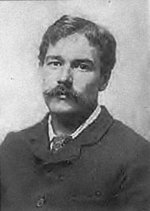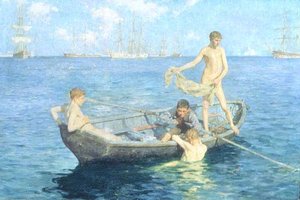Henry Scott Tuke
|
|
Henry Scott Tuke (12 June 1858–13 March 1929), British painter, is best remembered for his paintings of naked boys, which have earned him the status of a pioneer of gay male culture.
Tuke was born in York into a prominent family of Quakers. His father Daniel Hack Tuke was a prominent campaigner for humane treatment of the insane. His great-great-grandfather William Tuke had founded the Retreat at York, one of the first modern insane asylums, in 1792. His great-grandfather Henry Tuke, grandfather Samuel Tuke and uncle James Hack Tuke were also well-known social activists.
In 1874 Tuke moved with his family to London, where he enrolled in the Slade School of Art. After graduating he traveled to Italy in 1880, and from 1881 to 1883 he lived in Paris, where he studied with the French history painter Paul Laurens and met the American painter John Singer Sargent (who was also a painter of male nudes, although this fact was little known in his lifetime).
During the 1880s Tuke also met Oscar Wilde and other prominent poets and writers, most of them homosexuals (then usually called Uranian) who celebrated the adolescent male. He wrote a "sonnet to youth" which was published anonymously in The Artist, and also contributed an essay to The Studio.
Tuke returned to Britain and moved to Newlyn, joining a small colony of artists. These included Walter Langley, and Thomas Cooper Gotch a lifelong painter of the girl-child, who became a lifelong friend. These painters and others are known to art historians as the Newlyn School.
In 1885 Tuke settled in Falmouth, a fishing port in Cornwall, then still a remote and romantically rustic part of the country. He bought a fishing boat for 40 pounds and converted it into a floating studio and living quarters. Here could indulge his passion for painting boys in privacy. Most of his works depict boys and young men who swim, dive, and lounge, usually naked, on a boat or on the beach.
Tuke also produced more saleable works on narrative or historical themes. In these paintings Tuke placed his male nudes in safely mythological contexts, but critics have usually found these works to be rather formal and lifeless.
Ac.tuke2.jpg
From the 1890s, Tuke abandoned mythological themes and began to paint local boys fishing, sailing, swimming and diving, and also began to paint in a more naturalistic style. His handling of paint became freer, and he began using bold, fresh color. One of his best known paintings from this period is August Blue (1893-1894), a study of four nude youths bathing from a boat.
Although Tuke's paintings of nude youths undoubtedly appealed to those gay men who found adolescents attractive, they are never explicitly sexual. The models' genitals are almost never shown, they are almost never in physical contact with each other, and there is never any suggestion of overt sexuality.
Tuke formed close friendships with many of his models, but it has never been established that he was sexually involved with any of them, on either a romantic or commercial basis. Although it is possible that he was sexually active with local youths, it is equally possible that, like many gay men in this period, he sublimated his sexuality into romantic friendships, and into his art.
Ac.tuke4.jpg
Because of his subject matter, Tuke was unable to sell many of his works, except to a select circle of homosexual art collectors. But he was also well known as a portraitist, and maintained a London studio to work on his commissions. Among his best known portraits is that of soldier and writer T. E. Lawrence ("Lawrence of Arabia").
Technically, Tuke favored rough, visible brushstrokes, at a time when a smooth, polished finish was favoured by fashionable painters and critics. He had a strong sense of colour and excelled in the depiction of natural light, particularly the soft, fragile sunlight of the English summer. Had his choice of subject matter been more orthodox, Tuke might have become a major name in British painting: as it was he remained a niche painter.
Nevertheless, Tuke did enjoy a considerable reputation, and he did well enough from his painting to be able to travel abroad, painting in France, Italy and the West Indies. In 1900 a banquet was held in his honour at the Royal Cornwall Polytechnic Society. In later life he was in poor health for many years, and died in Falmouth in 1929.
After his death Tuke's reputation faded, and he was largely forgotten until the 1970s, when he was rediscovered by the first generation of openly gay artists and art collectors. He has since become something of a cult figure in gay cultural circles, with lavish editions of his paintings published and his works fetching high prices at auctions.
Further reading
- Emmanuel Cooper, The Life and Work of Henry Scott Tuke (with 35 colour and 25 monochrome plates), Heretic Books, 2003
External links
- Biography and extensive gallery of his paintings (http://andrejkoymasky.com/liv/tuk/tuk00.html)


